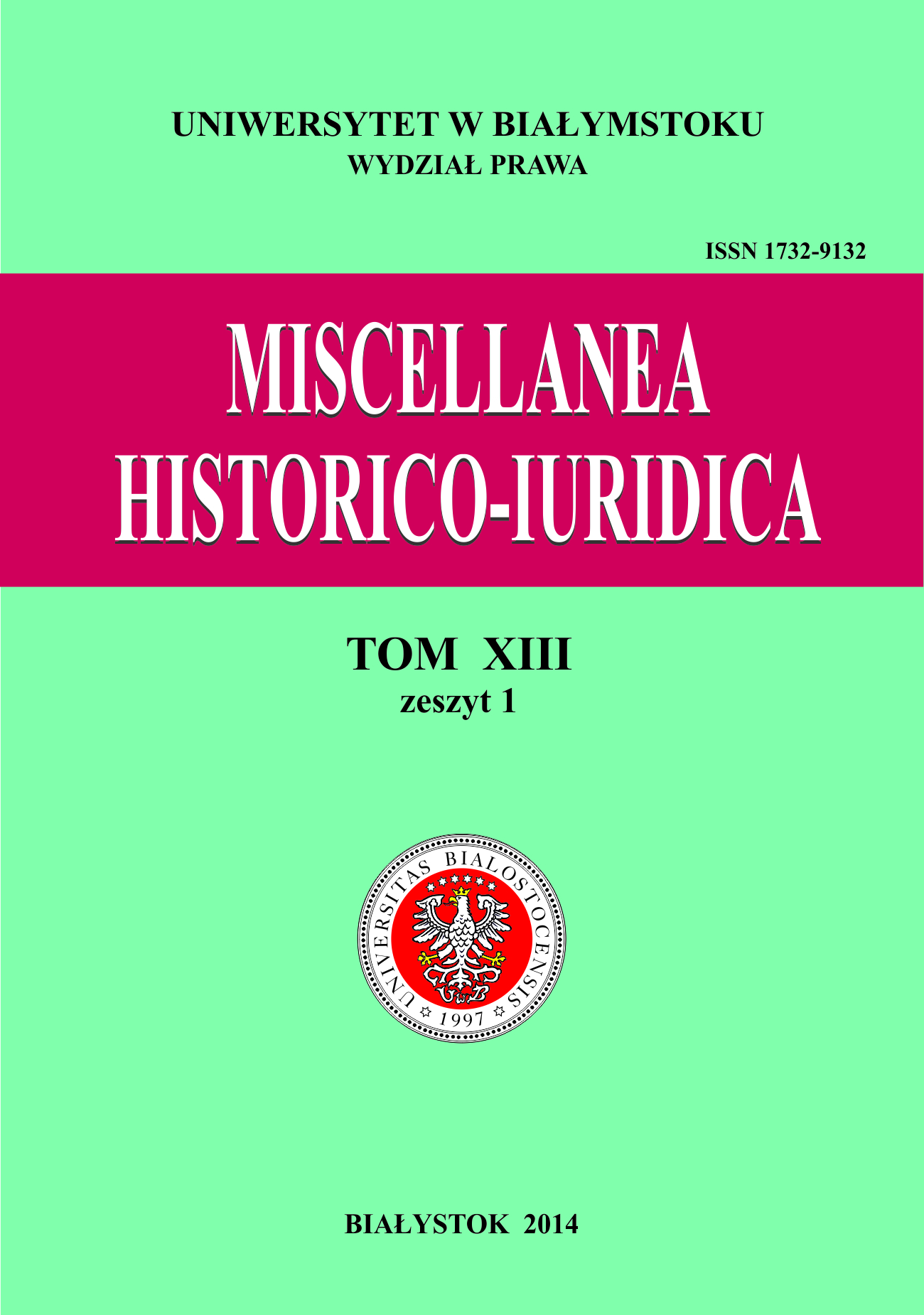The Emperor Hadrian’s rescript on the epicurean school in Athens
Keywords:
emperor, Hadrian, rescript, successor, epicurean schoolAbstract
In 121 AD, emperor Hadrian published a rescript in reply to the request submitted to the Princepsby the epicurean school in Athens via Trajan’s widow, Plotina. By virtue of the emperor’s constitution, head of the epicurean school at that time, Popilius Theotimos and his successors could freely select their successors irrespective of the candidate’s citizenship. Yet, the reasons underlying this regulation remain unresolved and not completely clear, especially that they remained in contradiction with the valid legal order and other regulations of emperor Hadrian in this respect. Presumably, special treatment of epicureans was attributable to Trajan’s widow, Plotina. Her influence onto Hadrian, who owed her much, was quite significant. Moreover, it was upon her request that the emperor’s constitution was issued, which may evidence that the empress followed the epicurean philosophy, which was the source of her care for the school in Athens.
References
Filodemos, O muzyce, O utworach poetyckich, Epigramy, przekł., wstęp i przypisy K. Bartol, Warszawa 2002.
Fontes Iuris Cognoscendi I, Gai Institutiones, przekł. W. Rozwadowski, Poznań 2003.
Fontes iuris Romani anteiustiniani, eds S. Riccobono, J. Baviera, C. Ferrini, J. Furlani, V. Arangio-Ruiz, pars 1. – Leges. pars 2. – Auctores. pars 3. – Negotia (FIRA), Florentiae 1940–43.
Gaius, Instytucje, przekł. z jęz. łac. i wstęp C. Kunderewicz, oprac. J. Rezler, Warszawa 1982.
Girard P.F., Textes de droit romain, Paris 1890.
Historycy cesarstwa rzymskiego. Żywoty cesarzy od Hadriana do Numeriana, oprac. i przekł. H. Szelest, Warszawa 1966.
Instytucje Gaja, przepolszczył, uwagami opatrzył i pierw otwór dodał T. Dydyński, Warszawa 1865.
Johnson A.C., Coleman-Norton P.R., Card Bourne F., Ancient Roman Statutes. A Translation with Introduction, Commentary, Glossary and Index, Austin 2003.
Marcus Porcius Cato, O gospodarstwie wiejskim, przekł. i oprac. S. Łoś, Wrocław – Kraków 1956.
Mytylene M., Inscriptiones Grecae et Romana pertinentes, t. IV, Paris 1927.
Oliver J.H., Greek Constitutions of Early Roman Emperors from Inscriptions and Papyri (Memoirs of the American Philosophical Society), Philadelphia 1989.
Alexander P.J., Letters and Speeches of the Emperor Hadrian, „Harvard Studies in Classical Philology” (HSCP) 1938, 49.
Amielańczyk K., Rzymskie prawo karne w reskryptach cesarza Hadriana, Lublin 2006.
Bartol K., Wstęp, [w:] Filodemos, O muzyce, O utworach poetyckich, Epigramy, przekł., wstęp i przypisy K. Bartol, Warszawa 2002.
Birley A.R., Hadrian. Cesarz niestrudzony, przekł. R. Wiśniewski, Warszawa 2002.
Bremen R. van, “Plotina to all her friends”: The letter(s) of the Empress Plotina to the Epicureans in Athens, „Chiron. Kommission für alte Geschichte und Epigraphik des Deutschen Archäologischen Instituts” 2005, 35.
Brunt P.A., From Epictetus to Arrian, „Athenaeum” 1977, 55.
Casavola F., Giuristi adrianei, Roma 2011.
Castner C.J., Prosopography of Roman Epicureans Between The Second Century B.C. and The Second Century A.D., Frankfurt/M., Bern, New York, Paris 1991, „Studien zur klassischen Philologie” 34, ed. M. Von Albrecht.
D’Orgeval B., L’empereur Hadrien. Oeuvre législative et administrative, Paris 1950.
Dorandi T., Plotina, Adriano e gli Epicurei di Atene, [w:] Epikureismus in der späten Republik und der Kaiserzeit. Akten der 2. Tagung der Karl-und-Gertrud-Abel-Stiftung vom 30. September – 3. Oktober 1998 in Würzburg, Stuttgart 2000.
Dydyński T., Cesarz Hadrian. Studium historyczno-prawne, Warszawa 1899.
Epiklet, [w:] Prosopographia Imperii Romani, eds E. Groag, A. Stein, t. III, Berlin 1943.
Gualandi G., Legislazione Imperiale e Giursprudenza, Milano 1963.
Hemelrijk E.A., Matrona Docta: Educated Women in the Roman Elite from Cornelia to Julia Domna, London 1999.
Hersbell J.P., The Stoicism of Epictetus: Twentieth-Century Perspectives, „Aufstieg und Niedergang der Römischen Welt” (ANRW) 1989, 2.36.3.
Howe H., Amafinius, Lucretius and Cicero, „American Journal of Philology” 1951, 72.
Kłodziński K., Udział sekretarzy ab epistulis i a libellis w procesie tworzenia reskryptów cesarskich, „Studia Iuridica Toruniensia” 2011, 8.
Korpanty J., Lukrecjusz, Wrocław 1991.
Krokiewicz A., Hedonizm Epikura, Warszawa 1961.
Long A.A., Epictetus: A Stoic and Socratic Guide to Life, Oxford 2002.
Łoś S., Rzym na rozdrożu. Studium monograficzne o Katonie Starszym, Warszawa 1960.
Łoś S., Wstęp, [w:] Marcus Porcius Cato, O gospodarstwie wiejskim, przekł. i oprac. S. Łoś, Wrocław – Kraków 1956.
McDermott W.C., Plotina Augusta and Nicomachus of Gerasa, „Historia” 1977, 26.
Millar F., Epicletus and the Imperial Court, „Journal of Roman Studies” (JRS) 1965, 55.
Mommsen T., Zu der Rechtsstellung der athenischen Professoren in der römischen Kaiserzeit, „Zeitschrift der Savigny-Stiftung für Rechtsgeschichte”, „Romanistische Abteilung” (ZSS) 1892, 12 = 25.
Morawski K., Dwaj cesarze rzymscy Tyberyusz i Hadryan, Kraków 1893.
Oliver J.H., The Empress Plotina and the Sacred Thymelic Synod, „Historia” 1975, 24.
Poste E., ‘Gaii institutionum iuris civilis commentarii quattuor’ or elements of Roman law by Gaius, Oxford 1890.
Reale G., Historia Filozofii Starożytnej, t. IV, Lublin 1999.
Spanneut M., Epiktet, [w:] Reallexicon für Antike und Christentum, ed. T. Klauser t. V, Stuttgart 1962.
Stadter P.A., Arrian of Nicomedia, Chapel Hill 1980.
Starr C., Epictetus and the Tyrant, „Classical Philology” 1949, 44.
Stephens W.O., Epictetus and Happiness as Freedom, London 2007.
Świrgoń-Skok R., Beneficja spadkowe w prawie rzymskim, Rzeszów 2011.
Świrgoń-Skok R., Przywileje spadkowe w rozwoju historycznym rzymskiego prawa prywatnego, „Ius et Administratio” 2013, 1.
Tatarkiewicz W., Historia Filozofii, t. I, Warszawa 1981.
Temporini H., Die Frauen am Hofe Trajans: Ein Beitrag zur Stellung der Augustae im Principat, Berlin 1979.
Timpe D., Der Epikureismus in der römischen Gesellschaft der Kaiserzeit, [w:] Epikureismus in der späten Republik und der Kaiserzeit. Akten der 2. Tagung der Karl--und-Gertrud-Abel-Stiftung vom 30. September – 3. Oktober 1998 in Würzburg, Stuttgart 2000.
Trojnar A., Działalność kulturalna Tytusa Pomponiusza Attyka, Katowice 1998.
Weber W., Untersuchungen zur Geschichte des Kaisers Hadrianus, Leipzig 1907.
Wesoły M., Epikureizm rzymski a Lukrecjusz, „Symbolae Philologorum Posnaniensium” 1998, 7.
Wilhelm A., Ein Brief der Kaiserin Plotina, „Jahreshefte des Österreichischen Archäologischen Institutes in Wien” (ÖJh) 1899, 2.
Wirth T., Arrians Erinnerungen an Epiktet, „Museum Helveticum” 1967, 24.







